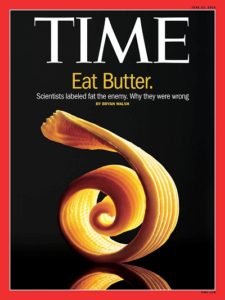Why “fat” in your diet doesn’t (necessarily) result in body fat
The last few years have been rife with media coverage of the benefits of fat – TIME even published a beautiful picture of butter on its cover.

So don’t worry that fat is the “evil” macronutrient that it was made to be in the low-fat craze of the nineties. On the other hand, it’s also not a miracle food. Putting butter in your coffee, for instance, will not help you lose weight if you’re also eating too many calories.
That’s because the number one rule of weight loss is: you must create a caloric deficit.
Butter and other fat sources are higher in calories than protein and carbohydrates. Fat contains nine calories per gram (9 cal/g) compared to four calories per gram in protein and carbs. It’s a far more energy-dense macronutrient, and can therefore be easy to overeat, especially when we’ve justified our food choice because it’s “healthy.”
So the first thing to consider when choosing to include fat in your diet is calorie content. We do this with portion control. A slice of butter on your veggies is cool; half a stick in your coffee is not. With me so far? Awesome.
The second consideration is quality of the fat source. There are saturated and unsaturated fats. Saturated fats come from animal sources and tend to be solid at room temperature (think butter, or bacon grease). Unsaturated fats come from plant sources and tend to be liquid at room temperature (like olive oil). I’m not going to delve into the “saturated fat will give you high cholesterol and you’ll have a heart attack and die” debate in this article because it would take too long, but suffice it to say that if you’re eating saturated fat in moderation (portion control), you’re going to be fine.
The best saturated fat sources come from pastured animals because grass creates a better nutrient profile. You’ll often see “grass-fed, grain finished” beef because the grain creates that awesome, flavorful marbling that makes for delicious steaks. That’s cool, too, just opt for leaner cuts of beef (eye of round steak, sirloin tip side steak, top round, bottom round, and top sirloin).
The best unsaturated fat sources are nuts, seeds, olives, avocados, and dressings made with those oils. Any coconut products or nut butters are also great.
Here’s the thing that most people don’t consider: unsaturated fats (like olive oil) are not the best choice for cooking because they are unstable at high heat. It’s best to cook with saturated fat like butter, ghee (clarified butter), lard, or tallow. Refined coconut oil is good, too (pure coconut oil lends a coconut-y taste to whatever you’re cooking).
To summarize: Eating fat does not make you fat; eating too many calories does. Fat is calorie-dense, so it’s easy to overeat calories if you eat a lot of fat. Everything in moderation.
Need help setting up a fat-loss diet?
Apply for your FREE strategy call today.
We’ll discuss your fitness goals, what’s holding you back, and
develop an action plan to get you there as fast as possible!
